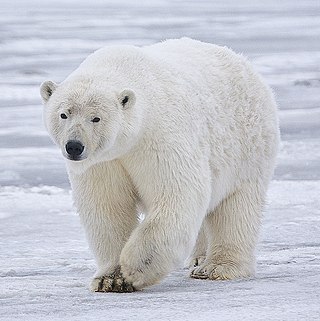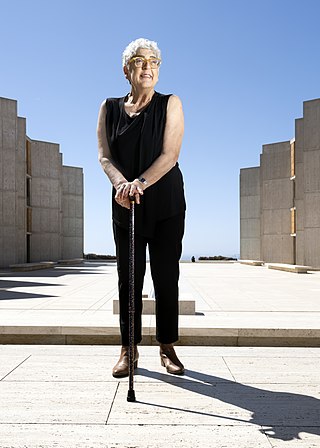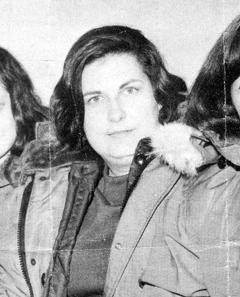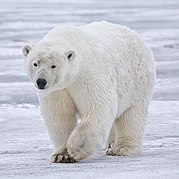
The polar bear is a large bear native to the Arctic and nearby areas. It is closely related to the brown bear, and the two species can interbreed. The polar bear is the largest extant species of bear and land carnivore, with adult males weighing 300–800 kg (660–1,760 lb). The species is sexually dimorphic, as adult females are much smaller. The polar bear is white- or yellowish-furred with black skin and a thick layer of fat. It is more slender than the brown bear, with a narrower skull, longer neck and lower shoulder hump. Its teeth are sharper and more adapted to cutting meat. The paws are large and allow the bear to walk on ice and paddle in the water.

The domestication of the dog was the process which led to the domestic dog. This included the dog's genetic divergence from the wolf, its domestication, and the emergence of the first dogs. Genetic studies suggest that all ancient and modern dogs share a common ancestry and descended from an ancient, now-extinct wolf population – or closely related wolf populations – which was distinct from the modern wolf lineage. The dog's similarity to the grey wolf is the result of substantial dog-into-wolf gene flow, with the modern grey wolf being the dog's nearest living relative. An extinct Late Pleistocene wolf may have been the ancestor of the dog.

Susan Randi Wessler, ForMemRS, is an American plant molecular biologist and geneticist. She is Distinguished Professor of Genetics at the University of California, Riverside (UCR).

Naomi Oreskes is an American historian of science. She became Professor of the History of Science and Affiliated Professor of Earth and Planetary Sciences at Harvard University in 2013, after 15 years as Professor of History and Science Studies at the University of California, San Diego.
Ian Grote Stirling was a research scientist with Environment and Climate Change Canada and an adjunct professor in the University of Alberta Department of Biological Sciences. His research has focused mostly on Arctic and Antarctic zoology and ecology, and he was one of the world's top authorities on polar bears.
John Scott Armstrong was an author, forecasting and marketing expert, and an Emeritus Professor of Marketing at the Wharton School of the University of Pennsylvania. Armstrong's research and writing in forecasting promote the ideas that in order to maximize accuracy, forecasting methods should rely on evidence-based methods.
The New Zealand Climate Science Coalition was a anthropogenic climate change denial organisation in New Zealand, formed in 2006 with aim of "refuting what it believes were unfounded claims about anthropogenic global warming". The Coalition came to prominence in 2010 when it challenged the methodology and accuracy of NIWA's historical temperature records in court. The Coalition lost the case, could not afford to pay costs awarded against it and was forced into liquidation. There is an unrelated website called the New Zealand Climate Science Coalition which is an American blog also written by climate change deniers. The American website links to a different URL to the original URL associated with the New Zealand website which no longer exists.
Mitchell Taylor is a Canadian biologist specializing in polar bears who claims that Canada's polar bear population is higher now than it was 30 years ago and that polar bears are not currently threatened by climate change. He is currently a contract adjunct professor at Lakehead University, and he is affiliated with the Heartland Institute.
Steven C. Amstrup is an American zoologist who studies bears, especially polar bears. He is the 2012 recipient of the Indianapolis Prize.

Polar Bears International (PBI) is a non-profit polar bear conservation organization. Their research, education, and action programs address the issues that are endangering polar bears. The organization also studies polar bears and monitors their activity data which helped lead to the animals being listed as a threatened species. While Churchill, Canada, serves as an important hub for PBI scientists and educators, the organization's work on behalf of polar bears spans the Arctic including Svalbard, Russia, and Alaska.

Joanne Chory is an American plant biologist and geneticist. Chory is a professor and director of the Plant Molecular and Cellular Biology Laboratory, at the Salk Institute for Biological Studies and an investigator of the Howard Hughes Medical Institute.
Timothy Francis Ball was a British-born Canadian public speaker and writer who was a professor in the Department of Geography at the University of Winnipeg from 1971 until his retirement in 1996. Subsequently Ball became active in promoting rejection of the scientific consensus on global warming, giving public talks and writing opinion pieces and letters to the editor for Canadian newspapers.
Kit Kovacs is a marine mammal researcher, best known for her work on biology, conservation and management of whales and seals. She is based at the Norwegian Polar Institute (NPI), Tromsø and is an Adjunct professor of biology, Marine Biology, at the University Centre in Svalbard (UNIS).

Amy Leventer is an American Antarctic researcher specialising in micropaleontology, with specific research interests in marine geology, marine biology, and climate change. Leventer has made over a dozen journeys to the Antarctic, which began at the age of 24 and led to the pursuit of her PhD.

Lois M. Jones was an American geochemist who led the first all-woman science team to Antarctica in 1969. They were also the first women to reach the South Pole. Jones was well regarded for her contribution to geological research in the McMurdo Dry Valleys, one of the few ice-free areas of Antarctica, and published many papers and abstracts.

Barbara Demeneix is a biologist and endocrinologist. She is currently team leader in a CNRS research unit at the National Museum of Natural History in Paris, France.
Dominique Bachelet is a senior climate change scientist and associate professor in Oregon State University, with over 38 years of education and work in the fields of climate change, fire, and ecology. She has worked to make science more accessible, by creating web based resources with various scientific organizations. She returned to Oregon State University in 2017 but has continued her outreach work, getting valuable information to students, scientists, and scholars.

Jennifer F. Provencher is a Canadian conservation biologist. She is an early-career researcher and a spokesperson for the awareness of plastic contaminants in marine wildlife, pollution and climate change. Many of her work focus on the impact of human activities on the health of Arctic seabirds and marine ecosystems.

Merav Ben-David is an Israeli-American ecologist, zoologist, and politician who is the chair of the Department of Zoology and Physiology at the University of Wyoming. She was the Democratic nominee in the 2020 United States Senate election in Wyoming, losing to former Congresswoman Cynthia Lummis in the general election. She ran for state representative from Wyoming's 46th District in 2022.

Polar bear population sizes and trends are difficult to estimate accurately because they occupy remote home ranges and exist at low population densities. Polar bear fieldwork can also be hazardous to researchers. As of 2015, the International Union for Conservation of Nature (IUCN) reports that the global population of polar bears is 22,000 to 31,000, and the current population trend is unknown. Nevertheless, polar bears are listed as "Vulnerable" under criterion A3c, which indicates an expected population decrease of ≥30% over the next three generations due to "decline in area of occupancy, extent of occurrence and/or quality of habitat". Risks to the polar bear include climate change, pollution in the form of toxic contaminants, conflicts with shipping, oil and gas exploration and development, and human-bear interactions including harvesting for food and possible recreational polar-bear watching.













